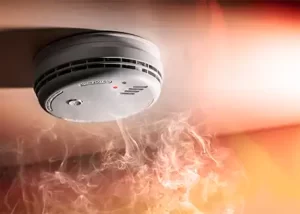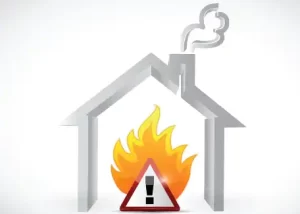By Nic Pugh, Health & Safety Technician
Fire prevention is an essential aspect of safety that everyone should take seriously. Fires can strike unexpectedly, causing devastation to people’s lives and property. However, with proactive measures and knowing what to look for, we can significantly reduce the risk of fires. This article will explore the importance of fire prevention and provide practical tips to keep you, your loved ones, and your property safe.
Fire prevention and safety is more than just the responsibility of fire departments and safety professionals. It’s a collective effort that involves individuals, families, and communities. The consequences of a fire can be severe, including injuries, fatalities, property damage, and emotional trauma. Preventing fires is the first line of defense.

Smoke alarms are your first alert to a fire. Install them in crucial areas of your home, such as bedrooms, hallways, and the kitchen. Regularly test and replace the batteries to ensure they’re working correctly.
Portable fire extinguishers are another great tool to have in your household. Keep portable fire extinguishers in accessible locations, like the kitchen and garage. Learn how to use them correctly and ensure they are regularly inspected and maintained.
 Develop a fire escape plan for your home. Ensure that every family member knows how to escape and where to meet outside. Practice fire drills regularly.
Develop a fire escape plan for your home. Ensure that every family member knows how to escape and where to meet outside. Practice fire drills regularly.
Cooking fires are a common cause of home fires. Never leave cooking unattended, keep flammable items away from the stove, and have a lid nearby to smother grease fires.
 Inspect your home for electrical hazards like frayed cords and overloaded outlets. Use surge protectors, and don’t overload circuits.
Inspect your home for electrical hazards like frayed cords and overloaded outlets. Use surge protectors, and don’t overload circuits.
Maintain heating equipment, including furnaces, fireplaces, and space heaters. Keep flammable materials away from heat sources.
If you smoke, do so responsibly. Use deep, sturdy ashtrays, and fully extinguish cigarettes before disposal.
If you live in a wildfire-prone area, create defensible spaces by clearing vegetation and maintaining a safe distance between trees and your home. Use fire-resistant building materials and landscaping to make your home less susceptible to wildfire.
Lastly, stay updated on fire safety news, alerts, and local regulations. Knowledge is a powerful tool for preventing fires and responding appropriately. Fire prevention is a shared responsibility that requires vigilance and commitment. Following these tips and staying informed can help to significantly reduce the risk of fires and contribute to a safer environment for you and your community. Remember, when it comes to fire prevention, every precaution you take matters.
Does your company need specialized safety training? RETTEW offers a variety of courses and services, like construction safety oversight and high-risk work program consultation, to ensure you and your staff are prepared. Contact us to learn more about RETTEW’s comprehensive and compliant safety training programs and consultations.
Additional Offerings
Safety training and consulting are only some of RETTEW’s 600-plus services. Our safety team works hand in hand with engineers, scientists, project managers, and other technical experts at places such as manufacturing facilities, drill pads, and commercial construction sites. We are well respected for our work in diverse industries and are known for ensuring workers and equipment remain safe, which keeps your projects on track and your bottom line growing.
